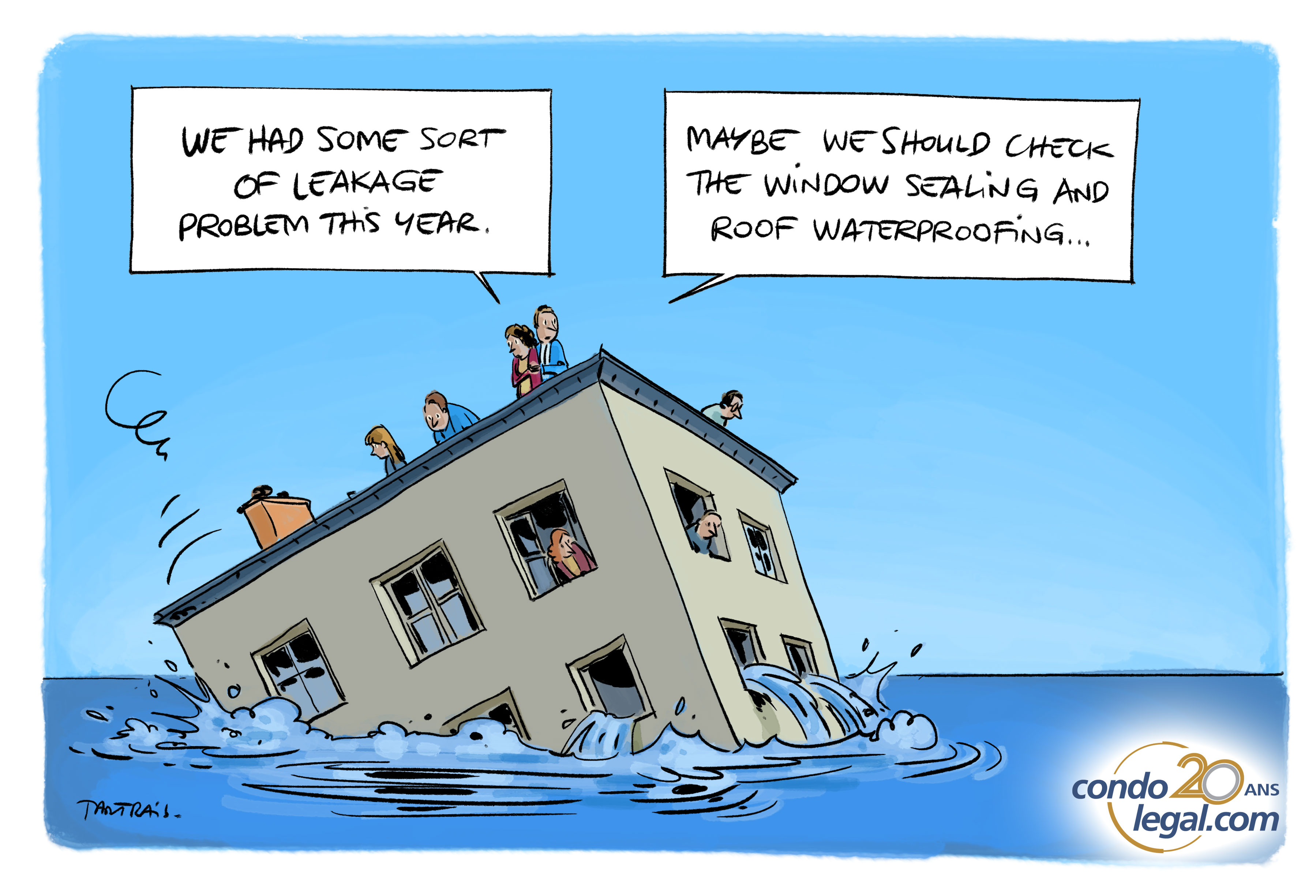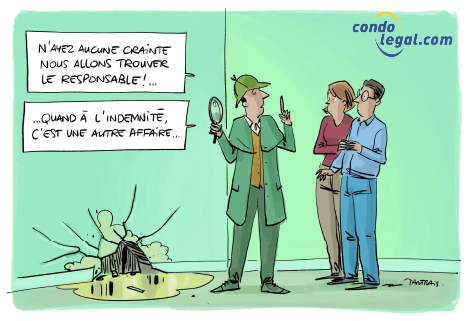What to do in case of loss?

Claims in co-ownerships are numerous: water leaks, water damages, vandalism, fire, etc. If the claim affects both the common portions and private portions of the co-ownership, it is the responsibility of the board of directors to handle the notice of loss with the syndicate's insurer and to arrange for its repair. Effective management of a claim requires prompt and efficient actions to ensure that your building is repaired or rebuilt as quickly as possible. Here is a summary of the precautions to take and a list of actions to perform as soon as you become aware of a claim, whether it is in the private or common portions.
You are an owner
Whether you are the co-owner occupant of your damaged apartment, or it is occupied by a tenant or other person, you shall carry out the required actions:
- Notify immediately the directors or manager of the co-ownership of the loss;
- Find the cause of the loss. If there is water damage and it originates in your apartment, you need to deploy the appropriate measures to limit the damage. Remember that everything must be done while avoiding putting the life or safety of any person in danger.
Also, remember that no matter the extent of damage or suspected cause, you should always report it to your broker or insurer, describing the circumstances of the loss. It should be the same for your tenant, let alone if he has taken out home insurance.
You are a director or manager
If you are a director or manager of the co-ownership, and you have been informed that a loss has occurred, you need to implement the necessary preservation measures and notify the insurer of the Syndicate, whatever the nature of damage or their presumed origin. If there is water damage, drain the water and dry out the premises affected by the loss. Again, you need to communicate your intentions to your insurer so that he can acknowledge them and decide of their relevance.
How and when to report the loss?
The claim of loss must be made to the insurer as soon as possible, in accordance with the provisions of the insurance contract (e.g. registered letter or email). In this regard, the article 2471 of Civil code of Quebec states:
"At the request of the insurer, the insured shall inform the insurer as soon as possible of all the circumstances surrounding the loss, including its probable cause, the nature and extent of the damage, the location of the insured property, the rights of third persons, and any concurrent insurance ".
When the circumstances are such that one should take immediate measures, e.g. dry the walls and ceilings, the insurance notification can be made by phone to a member of the Board of Directors (or sometimes with the manager) and to the insurer. But in any event a duly written statement should be sent to the insurer with proof of filing and delivery.
Not filing a claim with due diligence, or filing a false or misleading statement could result in very serious consequences. In some cases, your insurer could refuse to pay the indemnity sought or reduce its amount.
Safeguard the evidence
Do not destroy the evidence of the loss before the visit of the claims adjuster, as it will then be difficult to establish the amount of damages. If possible, document the damage with photos or videos.
Photograph soggy items before disposal to support your claim. Warning: In case of fire, do not venture in the damaged areas, unless you have obtained approval from the relevant department. And, except in an emergency, do not perform any repairs until your insurance company has authorized you to do.
Emergency work: do not waste a second
If there is water damage, you should dry out the affected areas as quickly as possible. This will prevent mold growth. The first two days are crucial in these circumstances. You should therefore retain the services of companies specialized in after loss cleanup operations. Your insurer may appoint them himself and then rush them to the scene. This being said, before authorizing any work whatsoever, make sure you understand what the chosen companies plan to do. Also take the time to get information on their rates!
Assignment of claim
After loss cleaning companies, contractors and other service providers may ask you to sign an assignment of claim. This would allow the insurer to pay directly invoices for work carried out in your home, and to deduct these amounts from your indemnities.This assignment is, however, not mandatory, as even though it simplifies the payment to service providers, it may nevertheless make it difficult to control the expenses related to the work.
To better control the expenses related to your indemnities, ask to provide in writing on the assignment of claim the maximum amount payable for the work to be done. The amount inscribed should not exceed the maximum (written in the insurance contract) that the insurer would pay in case of loss. Also, avoid the insurer paying that the last installment of the amounts due to the contractor, until you have declared yourself satisfied with the work. This declaration of satisfaction may be in a letter. You can also ask that the last payment be made by joint check to your name and the name of the contractor. You will thus avoid, and that the assignment of claims becomes a blank check.
What is a "claims adjuster" and how to deal with him?
Once the claim form completed, various participants will take the stage: the syndicate’s insurers, but also those of the co-owners and tenants who will in turn appoint their own claims adjusters. The latter will act as representatives of the insurer; they usually have the mandate to investigate the causes of the damage, assess their extent and / or identify the responsible party, if any.
They will contact the insured persons concerned to guide them with their claim. They will also want to validate your claim, identify its cause and generally examine the damaged premises. These adjusters will also carry out an estimate of the damage and negotiate the settlement. If people have been injured, they will ask to meet with them. It is in your best interest to collaborate with them. In short, cooperation is the golden rule.
The management of a loss to a private portion unit
The Board of Directors or the manager is responsible only for the administration of the common portions. It cannot intervene in private portions unless it is mandated by the affected owner to do so, in which case it will manage the claim and serve as liaison between the owner (and occupant) and the insurer of the syndicate.
 WHAT YOU SHOULD KNOW! In the aftermath of a loss of great magnitude, the directors should issue a statement, explaining to the co-owners and building occupants what happened. This document should also give information on the next steps.
WHAT YOU SHOULD KNOW! In the aftermath of a loss of great magnitude, the directors should issue a statement, explaining to the co-owners and building occupants what happened. This document should also give information on the next steps.
 WHAT TO KEEP IN MIND: During the management of a loss, the Board of Directors should have on hand, at all times, the keys of the affected apartments to access them as needed. If this is a problem, on account of a lack of cooperation by the co-owners concerned, the syndicate could therefore not be blamed if the work is delayed.
WHAT TO KEEP IN MIND: During the management of a loss, the Board of Directors should have on hand, at all times, the keys of the affected apartments to access them as needed. If this is a problem, on account of a lack of cooperation by the co-owners concerned, the syndicate could therefore not be blamed if the work is delayed.
 WARNING! Water damage is the most frequent claims in co-ownerships. They presuppose the deployment of concerted actions carried out quickly and in a coordinated manner. When such a loss occurs, time is the first factor to consider to limit the damage and start the insurance claims process quickly.
WARNING! Water damage is the most frequent claims in co-ownerships. They presuppose the deployment of concerted actions carried out quickly and in a coordinated manner. When such a loss occurs, time is the first factor to consider to limit the damage and start the insurance claims process quickly.
Back to the factsheets





